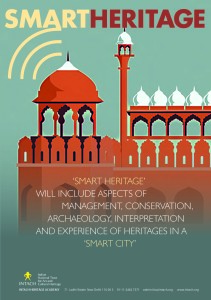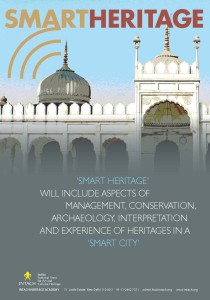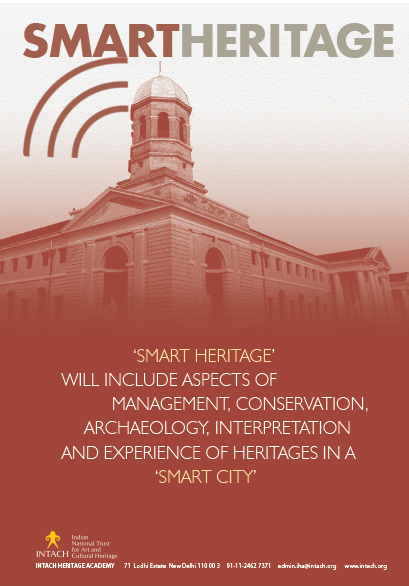- Home
- Programmes
- Smart Heritage
Smart Heritage
“Preserving the historic core” is an idea that recognises the value of heritage and strives to safeguard the authenticity of a place. However, the pace and pattern of urbanisation and modernisation ignores this idea and suggests a standard approach to ‘development’ that erodes the existing fabric, character and experience of the place. This impacts the quality of life of the people of the city at social, cultural and economic level.
The current and most popular scheme launched by the Government of India – ‘Smart City’, is a driver of mega-scale infrastructure development in ninety cities across the country. The Smart City Mission Statement outlines: ‘ The purpose of the Smart Cities Mission is to drive economic growth and improve the quality of life of people by enabling local area development and harnessing technology, especially technology that leads to Smart outcomes. Area-based development will transform existing areas (retrofit and redevelop), including slums, into better-planned ones, thereby improving the livability of the whole City. New areas (Greenfield) will be developed around cities in order to accommodate the expanding population in urban areas. Application of Smart Solutions will enable cities to use technology, information and data to improve infrastructure and services. Comprehensive development in this way will improve quality of life, create employment and enhance incomes for all, especially the poor and the disadvantaged, leading to inclusive Cities.’ (National Institute of Urban Affairs)
This does not acknowledge the existence of a historic layer(s) in a city. As a result, the heritage of a city remains isolated from the elements of change and is forced to remain frozen in time.

Since this roundtable, INTACH Heritage Academy (IHA) has undertaken a considerable amount of conceptual work on this subject.
This paper is developed with an aim to initiate a critical discussion on this theme and develop the concept of ‘Smart Heritage’ within the context of ‘Smart City’.
The key objectives behind this initiative are:
- to ensure a pivotal role of heritage for development and promotion of a ‘smart city’, and
- to explore if the ‘smart city’ project can incorporate ‘smart solutions’ for city’s heritage.
WHAT IS A SMART CITY?
The website of Ministry of Urban Development mentions: ‘… there is no universally accepted definition of a smart city. It means different things to different people. The conceptualisation of Smart City, therefore, varies from city to city and country to country, depending on the level of development, willingness to change and reform, resources and aspirations of the city residents. A smart city would have a different connotation in India than, say, Europe. Even in India, there is no one way of defining a smart city.’
However, in a wider international context, the understanding of Smart City idea is not so disappointing. There are a few agencies that have shared useful views on the concept of ‘Smart City’. One such organization is the International Data Corporation (IDC) which states that ‘Smart City is a concept that integrates information and communication technology (ICT) and internet technology (IT) with sustainable development and community engagement, and works to increase the economy of the city by promoting new businesses, talents and investments.’ (http://ec.europa.eu/eurostat/documents/3217494/7596823/ks-01-16-691-EN-N.pdf/0abf140c-ccc7-4a7f-b236-682effcde10f)
Smart City solutions are expected to use ICT to deliver high-quality services more efficiently, achieve operational cost savings and bring about a change in the behaviour and lifestyle patterns of the users and the community.
As per the Urban Europe: Statistics on Cities, Towns and Suburbs (2016 edition), the European Union defines a smart city as ‘a place where traditional networks and services are made more efficient with the use of digital and telecommunication technologies, for the benefit of its inhabitants and businesses‘. Designed and developed upon the cutting-edge technology and innovation, Smart Cities are designed to create a more inclusive, sustainable and connected environment.
The report continues to state that, ‘smart cities have the potential to improve the quality of life while ensuring the needs of present and future generations with respect to economic, social and environmental challenges’. Here again, the aspect of ‘culture’ is completely ignored. The quality of life is embedded in social interactions and cultural traditions which are key to shaping the built environment in a city. Any effort towards changing the quality of life of inhabitants of a city will need to consider the cultural needs of the community along with their economic and social aspirations.
An interesting perspective on Smart Cities is shared by the UK Department for Business, Innovation and Skills (BIS). It considers Smart Cities ‘a process rather than a static outcome, in which increased citizen engagement, hard infrastructure, social capital and digital technologies make cities more liveable, resilient and better able to respond to challenges’. (Centre for Cities website – http://www.centreforcities.org/reader/smart-cities/what-is-a-smart-city/)
The British Standards Institute (BSI) defines Smart City as ‘the effective integration of physical, digital and human systems in the built environment to deliver sustainable, prosperous and inclusive future for its citizens’. (Centre for Cities website –
http://www.centreforcities.org/reader/smart-cities/what-is-a-smart-city/)
Broadly speaking, a ‘Smart City’ plan works toward promoting cities that provide
- core infrastructural strength
- a high quality living
- a sustainable and inclusive environment
In India, the ‘Smart City’ focus has been on addressing the above aspects as well as on sustainable and inclusive development which can be replicated by other cities.
However, there has been a considerable oversight where heritage is an integral part of a city’s cultural infrastructure, economic prosperity and social well-being. When cities are aspiring to become ‘smart’, it is imperative for the heritage of the city to also move in the same direction. Why should the heritage of a city remain frozen in time? How does heritage become ‘smart’? What are the parameters of dealing with heritage in the context of smart city?
These are a few questions that need urgent and full attention of the decision-makers, policy-makers, city planners, smart city consultants, heritage professionals and concerned stakeholders.
To answer these questions, it is essential to develop a broad framework for the understanding of the concept of ‘Smart Heritage’. In the context of heritage, this concept shall include aspects of management, conservation, archaeology, interpretation and experience related to all heritages that are in or around a ‘Smart City’.
The basic premise behind this idea is that a ‘smart city’ approach, whether in a green field or brown field area, cannot ignore the history and culture of a place.
The key aspects that need to be considered whilst making heritage ‘smart’ are:
Management
– the stakeholders responsible for this aspect include the urban local bodies, Centre or State level government organisations, public and private enterprises and local communities
Conservation
– the stakeholders responsible for this aspect include Archaeological Survey of India, State Department of Archaeology (SDA), INTACH, Aga Khan Trust for Culture, UNESCO heritage experts, art and architectural historians and so forth
Archaeology
– the stakeholders responsible for this aspect include the Archaeological Survey of India, State Departments of Archaeology, universities and research institutions
Interpretation
– the stakeholders responsible for this aspect include museums, interpretation centers and visitor management and guide services
Experience
– the stakeholders responsible for this aspect include visitors to heritage places.
It is here that INTACH Heritage Academy proposes to develop ‘Smart Heritage Strategic Plan’ (SHSP) for every Smart City.
This document will provide a detailed background on the heritage of a city, assess the cultural significance of this heritage, outline conservation and management approaches and suggest ‘smart solutions’ for heritage management, and identify ‘smart tools for making the heritage assets smart.
In conclusion, the key aspect of any Smart Heritage approach will be to establish cultural heritage conservation and promotion as a unique component among smart city plans. This will inevitably require a different line of thinking and will serve different goals than smart city plans. The solutions will engage with information and communication technology for conservation, management, archaeology, interpretation and experience of heritage(s). The historical and cultural context of the city will help position its heritage in the wider context of technology led urban development and a specific role that it can play towards local urban, social and economic development.
The Smart Heritage strategies will have conceptual, management and operational implications for the integration of cultural heritage within smart cities. Each city will call for different course of action depending on the case. This indeed will result in unique, yet diverse, solutions for ‘smart heritage’ in different ‘smart cities’ in India.
© This concept has been developed by INTACH Heritage Academy. No part of this paper is to be reproduced manually or electronically without prior written permission of IHA. If permission is granted and the paper is reproduced in part or full, the due acknowledgement must be given to the authors of this paper.

Smart Heritage in Smart City – Pune

Smart Heritage in Smart City – Bhopal





